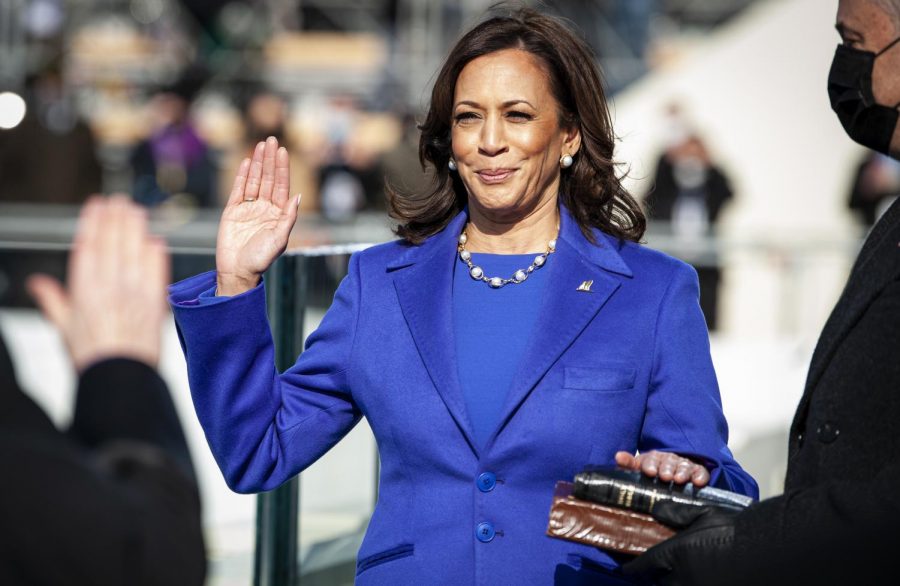Examining the impact of a female vice president
CHESS speaker series event set to discuss success and work left to do
Kamala Harris is sworn in on Jan. 20 as the first woman, Indian American and Black American vice president in the history of the United States.
March 2, 2021
It has been 232 years since the election of George Washington, with John Adams as his vice president. In 232 years, the U.S. did not have a female vice president. That is, not until the election of Kamala Harris.
Harris’ election marks monumental progress for minorities and women alike. An event scheduled for March 10 and hosted by Gannon University’s College of Humanities, Education and Social Sciences aims to celebrate this progress.
Featuring Daniella Gibbs Leger, the executive vice president for communications and strategy at American Progress, former special assistant to the president and director of message events in the Obama administration, “Madam Vice President” will analyze the election of Harris in the context of race relations, diversity and representation.
According to Leger, at the event she plans to dig into the effects of a female vice president on women, minorities and the U.S. as a whole. While these effects may be profound, it does not mean more progress cannot be made.
“The main message I want to convey is that we should celebrate when historic firsts are achieved, but that doesn’t mean that the work is done by any means,” Leger said.
Having Harris as a female vice president will set a precedent in U.S. politics that qualified women deserve to be in the political scene just as much as men, according to Carolyn Baugh, Ph.D., an associate professor and director of the women’s studies program at Gannon.
“Her importance and influence are broadcast nationally and internationally, setting an example for the inclusion of truly competent and qualified women as decision makers in this new administration,” Baugh said. “Old U.S. political habits of minimizing women’s roles and voices are challenged by having such an impeccably qualified woman in this role in which she is ‘a heartbeat away from the presidency,’ as well as by her prominent role in casting decisive votes in an equally divided Senate.”
Madelyn Feyko, a junior legal studies major and women’s studies minor, agrees that Harris’ election is an important step in achieving fair representation for women in politics. This representation is necessary in achieving truly just legislation.
“I think up until now, there have been countless decisions made about women or regarding women in a room full of men,” Feyko said. “I feel that finally having a woman at the table, and in an extremely important seat, will help pave the way for more advocacy for women in policy and decision-making.”
According to Leger, representation in politics is vital in ensuring that all groups of people have their needs met.
“When you have someone with your lived experience at the highest level of power, it can mean policies that are more responsive to your actual needs,” Leger said.
Feyko also believes that in the future, there will be a spike in women’s participation in U.S. politics because of Harris’ example. Women are beginning to understand that politics do not have to be male-dominated.
“It’s hard when you’re looking back at history at a bunch of old, white men who were president and vice president and genuinely believe that one day that could be you,” she said.
“Representation is extremely important and having that female representation in office right now is a huge confidence boost for not only myself, who’s studying to go to law school and get involved in politics, but for every woman and girl across this country.
“I think we will see a spike of women entering politics in the next four-plus years and for years to come because so many of us are realizing it is achievable.”
Harris’ election also impacts race relations in the U.S., according to Baugh. Having people of many different ethnicities, races and backgrounds allows for a more complete conversation within the political setting.
“The fact of having different groups and voices with seats ‘at the table’ means that new directions are possible on many different levels,” Baugh said. “Embracing polyvocality and the importance of constructive dialogue with those from different backgrounds and perspectives can lead to new and very substantive levels of progress.”
According to Anjali Sahay, Ph.D., an associate professor and director of the political science program at Gannon, Harris’ role as vice president has the possibility to inspire an entire generation of leaders who are women and minorities.
“In politics, symbolism matters, and the fact that a woman of color is occupying the second most powerful office in the country will bring unprecedented opportunity to push the country closer to justice and equality for marginalized communities and for all Americans,” Sahay said.
Feyko hopes that Harris’ role in office will allow for more dialogue between those in political positions and women and minorities. She also hopes that transformation will occur within the U.S. and that progress will continue to be made on the front of diversity.
“I’m hoping that as a nation that has a newly elected black woman (as vice president) that more voices can be heard, people of color can start to be heard, changes can start being made and healing can take place,” Feyko said. “I’m hoping that real, important legislation can be made, real changes in our justice system and real changes within our country will be made in the near future. And I’m hoping that Vice President Harris can take the lead.”
Above all, Harris’ election to the vice presidency will show other women that they, too, can rise to positions of power.
“Each time a woman is elected to a progressively higher office, women throughout the country begin to internalize the idea that they too can make their voices heard and contribute substantively to all levels of American political discourse,” Baugh said.
“More importantly, little girls — especially minority girls — are looking at Vice President Harris and noticing that the ceiling on how much they can contribute to serving this country has been effectively shattered. Girls are aware that it is a watershed moment — my own daughter was transfixed as Kamala Harris took her oath of office, but she was back on TikTok when Joe walked to the podium.”
Sahay also agreed that the fact that Harris is a woman will be encouraging to women in itself.
“To have a woman representing one of the highest offices in the country is barrier-breaking for many women,” Sahay said.
Feyko said that Harris’ election to the vice presidency opens opportunities to women and minorities that may have been seen as closed before.
“All it takes is one woman to get her foot in the door and hold it open for the rest of us regardless of gender, race, sexual orientation etc. and as of right now, that woman is Kamala Harris,” she said.
However, this is not without difficulty. According to Baugh, women have more pressure put on them as leaders.
“It is simply not the case that a white man has his ability to lead doubted based on his very existence as a white male, whereas many female and minority candidates have to prove themselves over and above a given standard just to be taken seriously,” Baugh said.
“Women and minority candidates have to be impeccable in their conduct in their personal lives and their political records and their business lives, a standard not necessarily applied to white male candidates.”
Feyko also said that it is more difficult for a woman to obtain respect and establish integrity in politics than it is for a man.
“Women have to jump through a lot more hoops to seem credible, establish themselves, prove they’re valuable and that their thoughts and words are important,” Feyko said. “A woman who’s saying the same exact thing as a man, for some reason, still has to prove herself time and time again in politics to be thought of and treated as equal to that man.”
But despite these difficulties, Harris was able to rise to a position of power despite being subjected to stereotypes and biases. According to Leger, this makes her election to office all the more inspirational.
“Harris was definitely subjected to a lot of racist rhetoric and conversations during the campaign,” Leger said. “But that she eventually became vice president has to be seen as another step forward toward a more equal and just society.”
Leger believes that change will come about, and she has hope in the upcoming generation to see it through.
“There has been significant change for the better in my lifetime, so I have to believe that these issues will continue to improve, especially as younger people enter the political arena,” Leger said.
“As Vice President Harris might say herself, somewhere in the country there is a young child of color wondering if they could someday be president. And they can look at the current vice president and know that it is possible.”
Harris’ election to the vice presidency sends a message to everyone that no matter one’s race, gender, sexual orientation or religion, anything is possible. Barriers are being broken, and women and people of color are being shown that their dreams are able to come to fruition, no matter how lofty they may be.
“I think this tells women and women of color to not give up on your dreams and passions, to be sure in who you are, so when the tough times come, you have your core beliefs to help push you through,” Leger said. “Having Kamala Harris be the vice president sends an important message to people everywhere – that there are still glass ceilings to crack, and there are women out there to crack them.”
The CHESS speaker series event “Madam Vice President: How the election of Kamala Harris changes – and doesn’t change – the state of race in America, and why the push for diversity and representation across all levels is crucially needed” will occur via Zoom at 7 p.m. Wednesday, March 10. Register for the event at https://engageu.gannon.edu/event/6728337.
ANNA MALESIEWSKI






